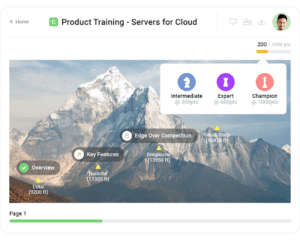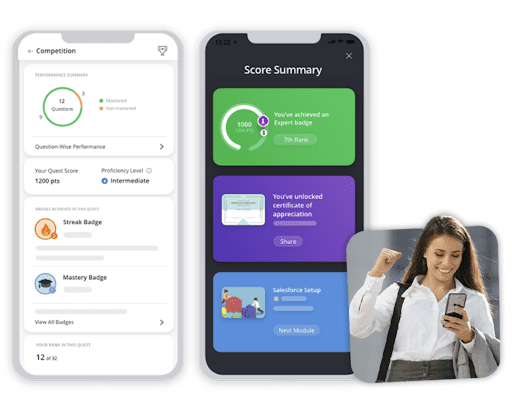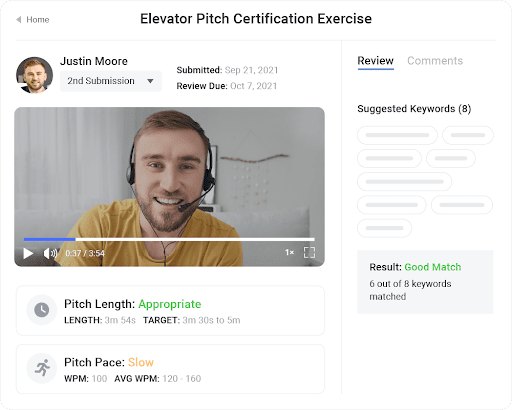Countless professions — from doctors to teachers to pilots to electricians — require years of formal training, hands-on practice, and official assessment of skills, and have further requirements for continuous education to maintain their licenses. Regardless of discipline, professionals must have a solid foundation of knowledge to be successful in their roles.
Too often, though, sellers aren’t held to those same requirements for continuous learning and certification. While formal seller onboarding is more commonplace today than in the past, it’s still not unusual for sellers to be hired, handed a digital folder of company, industry, and product information, and sent to their task. This is especially frequent in high-growth, start-up sales teams.
Even companies with onboarding programs that build initial seller knowledge typically fall short when it comes to hands-on practice, certification, and the ongoing training necessary to keep pace with product, market, competitive, and messaging changes.
But, just like with other professions, continuously building seller knowledge is the key to sales readiness. To achieve it, sales teams need to develop a state of excellence to enhance performance, adapt to change, and — you guessed it — increase seller knowledge.
Many sales teams, however, lack the resources, tools, and processes to create enablement programs that build and increase seller knowledge. But with the following tips, sales enablement leaders will be on their way to creating a team of highly knowledgeable sellers ready to take on the competition and grow revenue.
Building initial sales knowledge
Building initial sales knowledge starts on day one, but traditional onboarding approaches typically fall short of arming sellers with the knowledge and skills they need to be successful in the field. An effective approach to building initial seller knowledge includes the following characteristics:
Individualized
Every seller joins the team with a unique set of experiences. For example:
- Seller 1 has 10 years of experience in your industry in other functions but is new to selling.
- Seller 2 has been successfully selling for eight years, but never in your industry.
- Seller 3 is a recent grad who is green in selling and new to your industry, but hungry and ready to prove themselves.
A one-size-fits-all approach runs the risk of under-preparing sellers in areas where they lack experience while boring and disengaging them in topics they’ve already mastered. According to McKinsey, high-performing companies are two times as likely to offer personalized training for their sales reps. While this may sound unattainable, the best sales readiness software uses a combination of rules and adaptive intelligence to personalize training to individual sellers during onboarding and well beyond into continuous training.
Engaging, interactive formats
Even the most patient, engaged learner gets bored with traditional learning approaches. To build seller knowledge, you need to ditch the boring, hours-long e-learning courses, or days-upon-days of learners sitting through training, and opt for more engaging, interactive formats that leverage a mixture of presentations, hands-on exercises, and insights from real-world sales scenarios. This includes using things like:
- Shorter, visually rich content sourced from different subject matter experts and successful sellers
- Snippets from real-world sales calls
- Gamified assessments and knowledge checks
- Live challenges to assess knowledge in the moment
- Hands-on practice exercises to prove a seller’s mastery and readiness in topics


Reinforce knowledge
Salespeople need to retain the information shared during training and move it to long-term knowledge if they’re going to use it in the field and succeed. But according to Gartner, nearly 90% of that training will be forgotten within 30 days if the knowledge isn’t reinforced over time. So starting at onboarding, incorporate strategies to build a knowledge base that will overcome the forgetting curve. Hands-on practice and reinforcement activities are a great place to start. Exercises like virtual role-plays force sellers to articulate concepts in their own words, building muscle memory and preparing them for the field. And bite-sized, spaced reinforcement quizzes provide a fun, on-the-go mechanism to ensure that no seller is off the hook until they’ve retained key information.


Ongoing sales knowledge
The tips above don’t start and end in the initial knowledge-building phase. To arm your sellers with the knowledge they need to succeed, apply those same concepts to continuous seller training. And incorporating the following tips helps your sales teams pivot quickly and continuously improve:
- Just-in-time learning
The topics and content that sellers need to be enabled on are dynamic. A seller’s day-to-day job is prone to external factors beyond the company’s control. So sellers need quick access to just-in-time learning that’s tailored for the current selling environment and every selling situation.
- Bite-sized microlearning in accessible formats
Sellers are typically on the go, with schedules at the mercy of customers and prospects. They might need to do training offline when on an airplane, or listen to training when driving between meetings in the field. So for ongoing training and updates, opt for formats like podcasts or short, micro-learning that can be consumed easily by sellers, no matter how much time they have or where they are.
- Hands-on practice
Role-plays and practice exercises provide a great space for sellers to continuously build their knowledge in the context of specific deals or new messaging. Create a safe space for sellers to continuously practice beyond onboarding. Using a tool with AI insights enables sellers to practice on their own and get immediate feedback, in addition to getting coaching and feedback from their leaders.

- Real-world call snippets
Sellers learn best when you take training concepts from hypothetical and bring them to life. That’s why leveraging snippets from real-world calls is key to building ongoing seller knowledge. When you incorporate snippets into training, sellers learn from peers what works and what doesn’t. And when you give sellers the ability to review the conversation intelligence from their own calls, you enable them to learn from their own experiences and open their eyes to knowledge gaps or key behaviors and selling skills they may need to develop.
Be ready by building seller knowledge
The knowledge built amongst your sales team is critical in preparing them to tackle business and revenue challenges. When you build initial and ongoing knowledge and skills through enablement training, practice, and reinforcement, you arm your sellers with the key to unlocking real sales readiness. Want more tips on how sales leaders ensure reps receive the continuous training that’s vital to closing deals? Check out Ramp Time to Productivity: Why Sales Everboarding is the Secret to Your Success.







